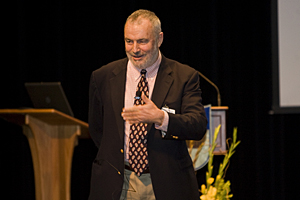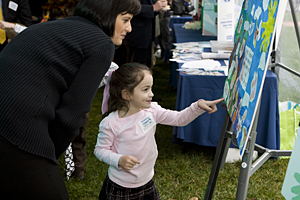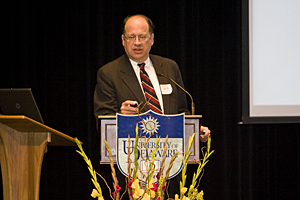

ADVERTISEMENT
- Rozovsky wins prestigious NSF Early Career Award
- UD students meet alumni, experience 'closing bell' at NYSE
- Newark Police seek assistance in identifying suspects in robbery
- Rivlin says bipartisan budget action, stronger budget rules key to reversing debt
- Stink bugs shouldn't pose problem until late summer
- Gao to honor Placido Domingo in Washington performance
- Adopt-A-Highway project keeps Lewes road clean
- WVUD's Radiothon fundraiser runs April 1-10
- W.D. Snodgrass Symposium to honor Pulitzer winner
- New guide helps cancer patients manage symptoms
- UD in the News, March 25, 2011
- For the Record, March 25, 2011
- Public opinion expert discusses world views of U.S. in Global Agenda series
- Congressional delegation, dean laud Center for Community Research and Service program
- Center for Political Communication sets symposium on politics, entertainment
- Students work to raise funds, awareness of domestic violence
- Equestrian team wins regional championship in Western riding
- Markell, Harker stress importance of agriculture to Delaware's economy
- Carol A. Ammon MBA Case Competition winners announced
- Prof presents blood-clotting studies at Gordon Research Conference
- Sexual Assault Awareness Month events, programs announced
- Stay connected with Sea Grant, CEOE e-newsletter
- A message to UD regarding the tragedy in Japan
- More News >>
- March 31-May 14: REP stages Neil Simon's 'The Good Doctor'
- April 2: Newark plans annual 'wine and dine'
- April 5: Expert perspective on U.S. health care
- April 5: Comedian Ace Guillen to visit Scrounge
- April 6, May 4: School of Nursing sponsors research lecture series
- April 6-May 4: Confucius Institute presents Chinese Film Series on Wednesdays
- April 6: IPCC's Pachauri to discuss sustainable development in DENIN Dialogue Series
- April 7: 'WVUDstock' radiothon concert announced
- April 8: English Language Institute presents 'Arts in Translation'
- April 9: Green and Healthy Living Expo planned at The Bob
- April 9: Center for Political Communication to host Onion editor
- April 10: Alumni Easter Egg-stravaganza planned
- April 11: CDS session to focus on visual assistive technologies
- April 12: T.J. Stiles to speak at UDLA annual dinner
- April 15, 16: Annual UD push lawnmower tune-up scheduled
- April 15, 16: Master Players series presents iMusic 4, China Magpie
- April 15, 16: Delaware Symphony, UD chorus to perform Mahler work
- April 18: Former NFL Coach Bill Cowher featured in UD Speaks
- April 21-24: Sesame Street Live brings Elmo and friends to The Bob
- April 30: Save the date for Ag Day 2011 at UD
- April 30: Symposium to consider 'Frontiers at the Chemistry-Biology Interface'
- April 30-May 1: Relay for Life set at Delaware Field House
- May 4: Delaware Membrane Protein Symposium announced
- May 5: Northwestern University's Leon Keer to deliver Kerr lecture
- May 7: Women's volleyball team to host second annual Spring Fling
- Through May 3: SPPA announces speakers for 10th annual lecture series
- Through May 4: Global Agenda sees U.S. through others' eyes; World Bank president to speak
- Through May 4: 'Research on Race, Ethnicity, Culture' topic of series
- Through May 9: Black American Studies announces lecture series
- Through May 11: 'Challenges in Jewish Culture' lecture series announced
- Through May 11: Area Studies research featured in speaker series
- Through June 5: 'Andy Warhol: Behind the Camera' on view in Old College Gallery
- Through July 15: 'Bodyscapes' on view at Mechanical Hall Gallery
- More What's Happening >>
- UD calendar >>
- Middle States evaluation team on campus April 5
- Phipps named HR Liaison of the Quarter
- Senior wins iPad for participating in assessment study
- April 19: Procurement Services schedules information sessions
- UD Bookstore announces spring break hours
- HealthyU Wellness Program encourages employees to 'Step into Spring'
- April 8-29: Faculty roundtable series considers student engagement
- GRE is changing; learn more at April 15 info session
- April 30: UD Evening with Blue Rocks set for employees
- Morris Library to be open 24/7 during final exams
- More Campus FYI >>
3:58 p.m., Oct. 23, 2009----More than 200 people attended the official debut of the Delaware Environmental Institute (DENIN) on Friday, Oct. 23, including a cadre of elementary and high school students who contributed posters on topics ranging from the benefits of trees to the problems associated with invasive species.
The event featured remarks by Delaware Gov. Jack Markell, UD President Patrick Harker, Provost Tom Apple, DENIN Director Donald Sparks, Delaware Department of Natural Resources and Environmental Control Secretary Collin O'Mara, and Environmental Protection Agency Regional Administrator William Early.
In addition, two prominent scientific speakers -- Francois Morel, a professor at Princeton University, and William Schlesinger, president of the Cary Institute of Ecosystem Studies -- delivered technical talks focusing on environmental issues.
In welcoming the audience to the event, Sparks, who is the S. Hallock du Pont Chair in Soil and Environmental Chemistry at UD, thanked the National Science Foundation for its financial support, which was provided through Delaware Experimental Program to Stimulate Competitive Research (EPSCoR) and has been instrumental in catalyzing the formation of DENIN. “Support from the Unidel Foundation and valuable input from faculty, administrators and stakeholders are also appreciated,” he said.
Sparks acknowledged that Delaware faces several very significant environmental challenges, including a fragile coastal ecosystem, a history of industrial production and agricultural land that is under pressure from increasing residential and commercial development.
“At the same time,” he said, “Delaware is in an ideal position to pilot research strategies to address these issues. The First State has a track record of effectively identifying, prioritizing and acting on difficult issues and valuable opportunities. Delaware's small size enables effective communication and issue resolution among key stakeholders.”
Markell lauded the University for establishing a collaboration that reaches beyond its own borders to include partners not only from other Delaware institutions but from organizations across the nation as well. He also emphasized the close link between the health of the economy and the health of the environment and expressed his commitment to put more people to work while creating a sustainable living environment.
“But I really want to say something to the kids,” Markell added. “They don't just understand the environment in their heads; they feel it in their guts. The future is very much tied up in the condition of the planet that we leave them.”
O'Mara said that addressing environmental issues is “not a one-discipline challenge” but will require scientists, engineers, policy-makers and social scientists to come together -- across agencies, across academic organizations and across levels of government. “How do we leverage all of our resources,” he asked, “not just to act locally but to make Delaware a national model for moving us toward a low-carbon future?”
He also echoed Markell's focus on the younger generation. “The kids get it,” O'Mara said, “and we have to take the view that the environment is not something that we inherit from our parents but something that we borrow from our children.”
Harker expressed his conviction that Sparks is the best person to head DENIN. “It was important that we have a man of Don's prominence to lead this Institute,” he said, “to raise its stature and to bring unparalleled energy and innovation, collaboration and credibility to our efforts.”
Harker also touched on the University's commitment to the new enterprise in terms of academic programs, facilities and faculty hires.
He cited three academic majors -- a bachelor of science in energy and environmental policy, a bachelor of science in environmental science and a bachelor of arts in environmental studies -- that collectively provide UD students with a range of options encompassing policy analysis, economics, social and natural sciences, and engineering.
The University's planned interdisciplinary science and engineering building will “blur the lines between disciplines and tear down the walls -- literally and metaphorically -- between instruction and research,” Harker said, “so that the research being conducted in one lab provides the content for the curriculum being taught next door.”
Once completed, the new facility will house not only DENIN but also the University of Delaware Energy Institute.
A new endowed chair in the environment -- named for former Board of Trustees chairman Howard E. Cosgrove and funded by the Unidel Foundation -- will help to “make UD a true hub of cutting-edge environmental study,” Harker said.
“This event culminates three days of sustainability activities on campus,” said Apple. “We're working to make a difference in our world.” The initiatives reflect the University's core values as reflected in the Path to Prominence, Apple said, and UD's partnership with K-12 children is one way that the University is reaching out to the community on environmental issues.
Early cited statistics to support his belief that it's no longer enough for us to reduce, reuse and recycle. “Humans have consumed more of the Earth's resources in the past 50 years than in the entire previous period of human history,” he said. “We have to rethink what we're doing, what we buy and how we as a society manage our resources.”
Morel, the Albert G. Blanke Jr. Professor of Geosciences at Princeton University, spoke on acidification of the oceans.
“We all know about greenhouse gases in the atmosphere and their effects on climate change,” he said, “but there's another change because of CO2, and that's in the ocean.”
Morel said that about one-third of human-generated emissions is now in the ocean, and because the ocean mixes slowly, most of it is in the upper 10 percent of the water. As a result, carbonate levels have decreased. “This is important,” Morel said, “because carbonate is an essential part of the skeletons and shells of a number of organisms, including corals.” The Great Barrier Reef has already displayed evidence of declining calcification.
Morel pointed out that while changes in CO2 levels have risen and fallen cyclically over the past million years, the rate of change has increased significantly over the past hundred years.
“We know that changes in CO2 and pH affect biological processes such calcification, nutrient uptake and carbon fixation,” Morel said. “The consequences for ocean ecosystems are largely unknown, but it's reasonable to believe that there will be effects.”
Schlesinger, president of the Cary Institute of Ecosystem Studies in Millbrook, N.Y., shared with the audience his ideas for how studies of ecosystem science and biogeochemistry can help solve environmental problems. He pointed out that the field of biogeochemistry, which is inherently interdisciplinary, can help policy-makers in formulating plans for mitigating and remediating problems resulting from the mobilization of humans on Earth.
“Our congressmen and senators need to know that we have an active science which can quantify the imprint of humans and determine its effects,” he said.
For example, Schlesinger displayed data showing that the human carbon contribution to global biogeochemical cycles is only 6.7 percent of the total. “This is a relatively small perturbation,” he said, “but it demonstrates that it doesn't take big changes through human activities to have a major effect on ecosystems.”
DENIN's goals are to initiate interdisciplinary research projects that integrate environmental science, engineering and policy; support interdisciplinary academic programs; forge partnerships among government agencies, nonprofits, industry, policymakers and the public to address environmental challenges; and coordinate and sponsor University-based interdisciplinary initiatives.
“The environmental issues facing the state are too complex to solve using traditional means,” said Sparks. “They demand that we come up with innovative applications of science, engineering and public policy and that we collaborate with outstanding researchers who are conducting cutting-edge and highly relevant environmental research.”
Article by Diane Kukich
Photos by Ambre Alexander



